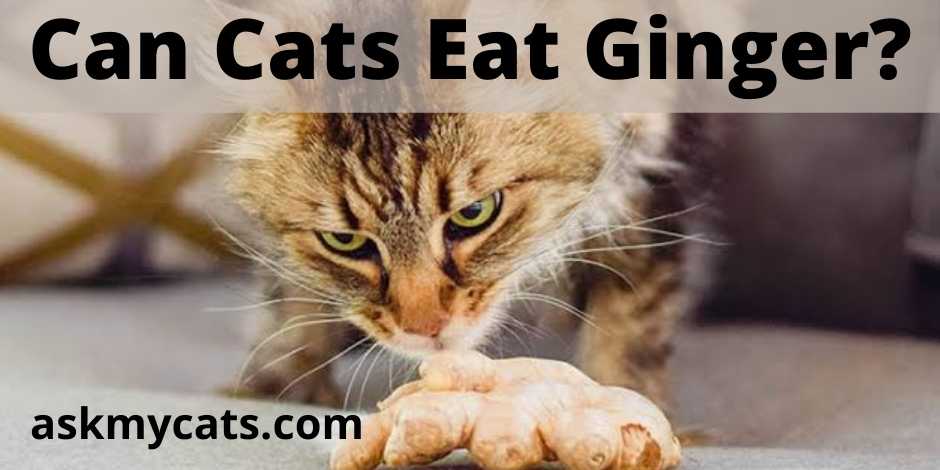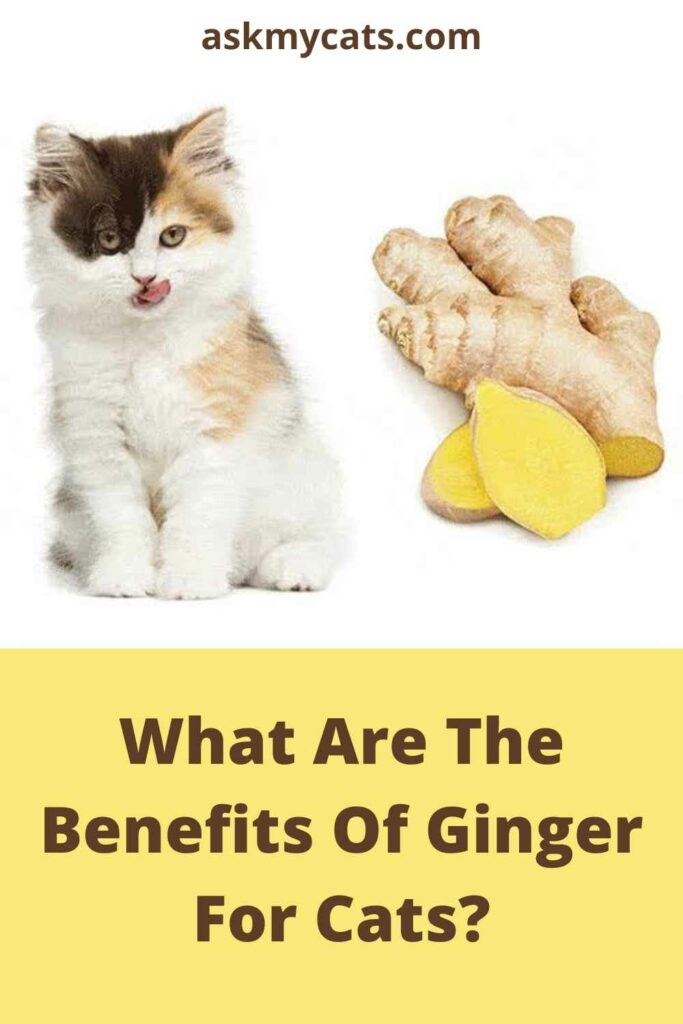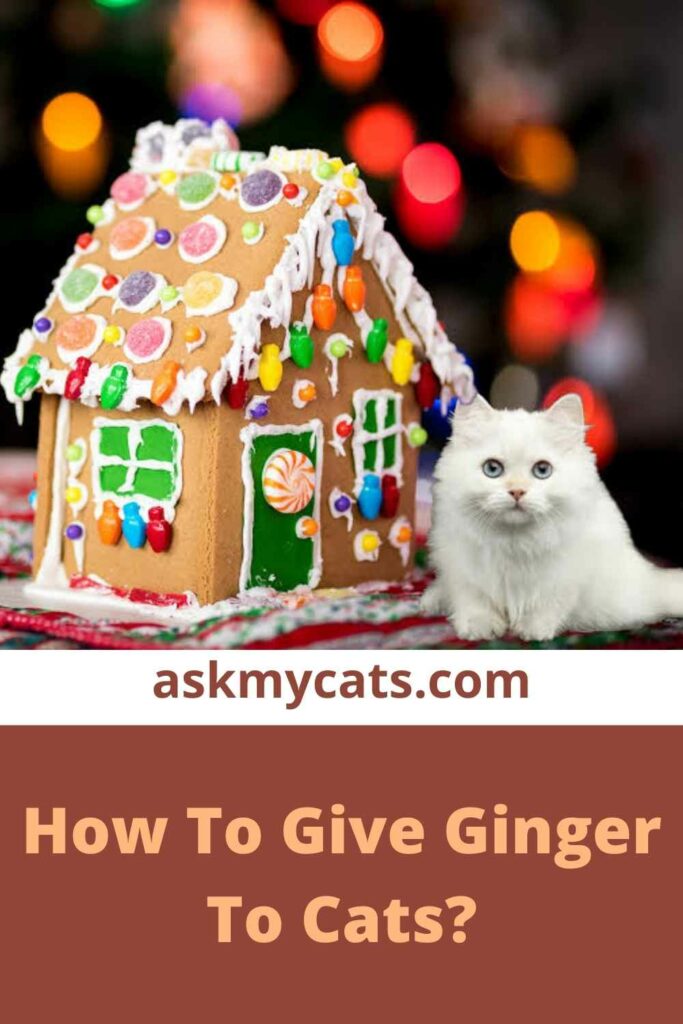When people have an upset stomach or another minor health condition, ginger might be beneficial. Is the herbal root, however, equally beneficial to cats?
Yes, ginger is one of several human foods that are healthy for cats to consume. Not only are cats safe to consume ginger, but it can also benefit their health in the same way that it does for us. However, be cautious, since too much ginger can induce minor gastrointestinal distress on its own.
If you want to know more about the benefits of ginger and the ways it can help your feline friend stay healthy, keep reading!


Give Your Cat the Perfect Day
Get the Free Ebook!
Is Ginger Bad For Cats?
Ginger isn’t truly necessary for your cat’s regular diet. Ginger should be used as a medical herb rather than a daily herb.
Ginger is acceptable and safe for cats if used in tiny amounts or as part of a herbal recipe.
However, there is not enough research to determine if giving ginger to pets on a daily basis and for an extended period of time has any significant negative effects.
Ginger is used as a therapeutic plant by many holistic practitioners for both humans and animals. If you want to use it for a brief period of time, use the suggested doses. If you want to use it more frequently and for a longer period of time, see your holistic veterinarian so they can keep an eye on your pet.
Stop giving ginger to your cat as soon as you see any negative side effects. A small amount of ginger for your cat to aid with things like illness and other issues should be okay in the short term.
Is Ginger Plant Toxic To Cats?
When administered as a tiny part of an appropriate herbal mix, cats tolerate ginger quite well.
The wild ginger rhizome is the true treasure. They’re tiny, but they’re delicious and excellent. Regrettably, they’re just mildly poisonous.
The plant Alpinia Zerumbet is not toxic. There shouldn’t be any issue with ginger leaves for your cats (referring to the true gingers, Zingiberaceae). The leaves of several ginger species, as well as other sections of the plants, are utilized in cooking and other applications.
What Are The Benefits Of Ginger For Cats?

So, what are the advantages of ginger in cats’ diets? This root has antibacterial characteristics that can help your cat’s immune system function better. They can also be used to treat motion sickness and mild gastrointestinal issues in cats.
If your pet’s appetite has waned, try adding some ginger to her diet. It’s possible that the flavor will encourage your pet to eat.
In addition, ginger may help your pet’s digestion if he or she has indigestion. It aids in the release of enzymes that your pet requires to digest food more quickly.
Other benefits of cats eating ginger include:
- Treating Canine Heartworm disease
- Prevents nausea and vomiting
- Aids in digestion
- Helps with problems such as gastroenteritis
- Aids in emptying stomach
- Helps in preventing cardiovascular disorders
- Helps with respiratory symptoms such as coughs
- Anti-Inflammatory
- Helps calm diarrhea
- Help reduce bloating
- Calms irritable bowel syndrome
- Acts as an anticancer agent
Do Cats Like The Smell Of Ginger?
Don’t be misled by your cat’s cute little nose. Their sense of smell is pretty acute.
Their brains are jam-packed with structures and organs that support their amazing sense of smell. In addition, they have an additional scent organ in their lips.
Cats do not detest the smell of ginger. Gingers can be used as a herbal ingredient for your cat’s food. However, make sure that she consumes it in a small amount.
Can Cats Have Ginger Ale?
Ginger is used in making ginger ale. People drink it when they experience indigestion or nausea after a long road trip, in addition to being a sweetened beverage.
Ginger ale, on the other hand, is not allowed for cats. Cats benefit from ginger in its natural form. However, ginger ale is poisonous for cats.
Ginger ale is a carbonated beverage that has been sweetened. In addition, your cat should not consume drinks or sweets. Caffeine, which is included in ginger ale, is a stimulant that should never be given to your pet.
Caffeine includes theobromine, which is harmful to cats. It may raise your pet’s heart rate.
Caffeine use in cats has been linked to hyperactivity, fast heart rates, tremors, seizures, elevated blood pressure, and cardiac arrhythmias, according to research. Furthermore, too much sugar in a cat’s diet can lead to obesity or possibly type 2 diabetes.
So, while you’re sipping a glass of ginger ale, enjoy it on your own. Allowing your cat to drink ginger ale is never a good idea.
Can Cats Eat Ginger Snaps?
No, cats should not eat ginger snaps. The dough used in making them are harmful to your cat’s health even if they are not allergic to wheat. Similarly, ginger snaps are unsafe for cats.
While cats may eat a little amount of bread, and ginger is not only harmless but also helpful to them, several components in the ginger snap are harmful to your feline companion.
1. Nutmeg
To begin, ginger snaps contains nutmeg, a popular spice produced from the seeds of Myristica Fragrans. When ingested in high quantities, nutmeg is toxic to pets. It can induce a mildly upset stomach, hallucinations, disorientation, elevated heart rate, high blood pressure, dry mouth, abdominal discomfort, and seizures.
You don’t want to put your pet’s health in danger by giving them nutmeg, even if it’s a small amount.
2. Cinnamon
Second, as popular as it is, cinnamon, particularly cinnamon essential oil, is possibly harmful to cats. It can induce vomiting, diarrhea, and oral blisters if consumed in excessive amounts. Inhaling cinnamon, in addition to eating it, may irritate their lungs.
3. Cloves
Third, cloves are poisonous to cats because they contain a chemical called eugenol, which can induce liver poisoning in cats.
4. Other ingredients
Some producers employ xylitol, a sugar-free sweetener often found in candies, peanut butter, and occasionally baked goods like cake frosting. It might induce low blood sugar and liver damage in your pet if consumed.
Can Cats Eat Gingerbread Cookies?

The simple answer is that giving your pet a tiny piece of gingerbread cookie may not create any difficulties, but giving your pet a huge amount of gingerbread cookie may cause your pet to become ill.
It’s crucial to note that even if a baked item contains no hazardous components, it can still induce gastrointestinal distress and pancreatitis in cats and dogs.
If you have dietary restrictions and have prepared or purchased sugar-free gingerbread cookies, be aware that they may include xylitol, a sugar alternative that is harmful to cats even in little doses.
Here are the common gingerbread cookie ingredients. This list will inform you of the ingredients that are harmful to your cat.
- Butter, which is not poisonous but can induce gastrointestinal distress and even pancreatitis if consumed in excess.
- Flour, which is not poisonous but unhealthy.
- Baking soda, which is harmful in big quantities.
- Brown or white sugar, which is not harmful, but eating too much of it over time can contribute to weight gain and diabetes.
- Molasses, which a sugary substance that is as harmful as sugar.
- Salmonella illness is a possibility if your pet consumes the uncooked batter.
- Vanilla extract, whether pure or fake, contains 35 percent alcohol, which is harmful to cats and dogs.
- Spices, none of them are harmful in tiny amounts, but they can be toxic in big amounts or concentrated oils.
- Ground ginger, large quantities of which can induce gastrointestinal distress and fatigue.
- Cinnamon, excessive quantities can induce vomiting, diarrhea, mouth and lung discomfort, low blood sugar, and heart rhythms.
- Allspice, which includes eugenol, a chemical that can induce liver damage in cats.
- Cloves, which includes eugenol.
- Nutmeg is not traditionally used in gingerbread cookies, but every recipe is different. In excessive doses, a toxin known as myristicin can produce hallucinations, confusion, tachycardia, hypertension (high blood pressure), dry mouth, stomach discomfort, and seizures.
- Salt – too much salt can lead to increased thirst and poisoning.
- Icing/Royal Icing contains sugar.
- Meringue powder, which contains eggs or raw egg whites
- Confectioners’ sugar, which is harmful.
If you’re sorry that your pet won’t be able to enjoy a gingerbread cookie this holiday season, consider these alternatives while baking gingerbread cookies.
- Remove the vanilla essence or replace it with a non-alcoholic version.
- Remove the frosting off the cake.
- Use whole wheat flour.
- Remove the sugar and replace it with molasses and peanut butter.
- Use peanut butter that does not contain xylitol.
- Don’t season with salt.
- Remove the clove and spices from the recipe.
Is Ginger Oil Safe For Cats?
In a nutshell, there are no safe essential oils for cats; they’re all potentially harmful to your feline companion. According to the ASPCA, in their concentrated state, ginger oil may certainly be a hazard for cats, especially when the oil is applied to their skin, fur, or paws.
If you want to utilize essential oils in your house, you may take certain precautions. One method to minimize toxicity is to use diffusers instead of concentrates.
Ginger oil should not be given to your cat. You may put a drop of essential oil in a burner or humidifier, and your pet will naturally work with it to cure itself.
We recommend utilizing a diffuser in a well-ventilated area and keeping your cat away from it and its cables. This is because the dispersed oil droplets can land on your cat’s fur, which they might swallow when grooming. You can never be too careful when storing essential oils because cats are adept at climbing onto high surfaces and into little areas.
Difficulty in breathing, coughing, wheezing, drooling, vomiting, tremors, wobbliness, and a low heart rate are all symptoms of essential oil intoxication. If you believe your cat has swallowed an essential oil, contact your veterinarian or an emergency clinic right away, and stop using it if it causes irritation or pain.
Consult your veterinarian before using essential oil products or ginger oil diffusers in your house to guarantee your pet’s health and safety.
How To Give Ginger To Cats?

Ginger comes in a variety of forms- fresh, dried, pickled, preserved, crystallized, candied, powdered, or crushed
Here are the following ways you can give ginger to your cat:
- Grate a little bit of raw garlic and sprinkle/mix it into the meal.
- If you’re using a herbal tincture, be sure the plants you’re using aren’t harmful to your cat or dog.
- You can make your own ginger flower water for your feline companion.
- Capsules – make sure they aren’t combined with any potentially hazardous substances.
- Ginger pills that are 100% pure
- Ginger tea that is brewed at home, It simply requires the root and boiling water.
- You could give your cat fermented ginger. Make sure there is no alcohol in the fermented ginger. It’s really easy to ferment ginger, and it’s a fantastic probiotic for both you and your pet.
- As ginger powder. Choose a high-quality, pure powder.
- As ginger root extract. Give only a few drops.
Do not feed ginger essential oil. You may put a drop of essential oil in a burner or humidifier, and your pet will naturally work with it to cure itself.
The sugar level of candied, preserved, or crystallized ginger is too high for your pet. The greatest ways to get the advantages of ginger’s therapeutic qualities are to eat it fresh or powdered.
How Much Ginger Can You Give A Cat?
You should feed ginger to your pet only in moderation. The amount of ginger your pet can eat is determined by her age, weight, and size.
You may prepare the roots for your pet by boiling them and then allowing them to cool before serving. For every 5kg cat, one tablespoon should be served.
You may add a pinch to your pet’s food if you’re serving it uncooked. Ginger should not be given to your pet on a regular basis. It’s a medical root that should only be offered to pets when they’re in desperate need.
What Are The Recommended Ginger Dosages for Cats?
Ginger can be given to cats in a variety of ways, including a very tiny quantity grated over/into their food, powdered, or as tea. The dosage will be determined by your cat’s weight, breed, age, and whether or not she has an underlying medical condition.
Starting with a very little amount of peeled ginger (grated/ground) put into their food or roughly a spoonful of handmade ginger tea for a 5kg cat is a good place to start.
This should only be given to your cat once or twice a day and for no more than two or three days. If negative symptoms persist, you should consult your veterinarian.
Frequently Asked Questions
Are Ginger Biscuits Okay For Cats?
No, ginger biscuits are not good for your cat. While you may not notice any bad effects on your pet’s health right away, ginger biscuits are heavy in oil and lipids, which might cause your pet to become sluggish.
Is Ginger Poisonous For Cats?
Ginger should not be given to pets that are allergic to it or who have a history of bleeding disorders. Because its safety has not been proved, it should be used with caution in cats with gallbladder disease, as well as pregnant or nursing animals.
Do Cats Like Ginger?
Overall, cats handle ginger well and are unaffected. In the same way that ginger may help people with an upset stomach, it can also help cats.
Final Words
Ginger is a very strong therapeutic herb, but like with everything, there might be severe side effects if you use it too much. Ginger can reverse the effects that cause pain, inflammation, bloating, and even diarrhea in the stomach and intestines.
Keep track of how much you’re feeding your pet, how often you’re giving it, and if you’re giving it the right quantities for the right length of time. If, for example, their illness has subsided, refrain from providing ginger on a regular basis.
If you are giving ginger to your cat to treat a more serious health problem or is pregnant, see your veterinarian to ensure proper dose and monitoring of the effects.
Because each pet’s response will vary depending on their underlying health condition, be cautious, watch your pet, and avoid overdosing your pet.
If you have any more queries regarding your feline friend, drop them in the comment section below.
